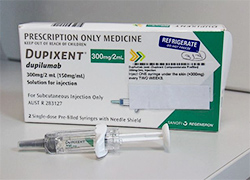Dupilumab (Dupixent®)
A new biologic treatment for atopic eczema offers real hope to those living with more severe eczema
Dupilumab* (Dupixent®) is a new ‘biologic’ treatment for severe eczema which works in a different way to the other drugs that are currently available for eczema. Biologic drugs are produced by genetically modified organisms such as bacteria or cells cultured in a laboratory. Dupilumab is the first biologic treatment for atopic eczema and is taken subcutaneously (under the skin). There are other biologic treatments for atopic eczema that are currently undergoing research.
How does it work?

Chemical messengers in the body called interleukins (ILs) allow the different parts of our immune system to communicate and help fight off harmful viruses and bacteria. The immune system of people with inflammatory conditions like atopic eczema overreacts to allergens (eg dust, mould, pollen). This triggers the production of certain ILs, which cause greater inflammation. It is this chronic inflammation that leads to symptoms of eczema such as red, itchy, dry patches on the skin.
Biologics works by blocking ILs from binding to their cell receptors (protein molecules that receive chemical signals from outside a cell); this stops the immune system from overreacting. Dupilumab works on two specific ILs thought to contribute to atopic conditions: IL-4 and IL-13. By Blocking IL-4 and IL-13 from binding to their cell receptors, dupilumab limits to the overreaction of the immune system, dampening down the chronic inflammatory response and lessening the symptoms of atopic eczema.
If you think of a chemical messenger such as IL-4 as a key, and a cell receptor as lock, a biologic drug works in a similar way to fixing a coin over the keyhole so that the key (IL-4) is unable to get into the lock (the cell receptor).
Immunosuppressive drugs for eczema (eg ciclosporin) suppress many different chemical messengers that control inflammation, whereas biologic drugs suppress just one or two of these chemical messengers and have fewer potential side effects than conventional immunosuppressive drugs.
What has the research shown?
Clinical trials of dupilumab have shown that it produces a meaningful reduction in the severity of eczema, as well as a reduction in the body surface affected by eczema in the majority of patients. Many patients receiving dupliumab also experience a reduction in itching and an improvement in sleep and quality of life. The trial data results showed that many patients taking dupilumab no longer needed to apply as much topical steroid while taking the drug.
Who is it for?
Dupilumab is licensed for the treatment of children from 6 years of age and adults with moderate-to-severe atopic dermatitis (atopic eczema) who are possible candidates for systemic therapy who have failed to respond to optimally prescribed topical treatments.
How do I go about getting it?
If you think you might be eligible for dupilumab, speak to your Dermatologist or Immunologist about the possibility of trying it. It will not be offered by GP; you will need to be referred to see a specialist.
How is it administered?
Dupilumab is given by injection under the skin once every two weeks. A single syringe and needle delivers one dose. Unlike other drugs treatments for eczema, patients are able to administer dupilumab themselves after having received appropriate training from a healthcare professional.
How much does it cost?
This medicine is injected once every two weeks and is not intended for episodic use. With the PBS subsidy, eligible patients will only need to pay $41 per prescription, or $6.60 with a concession card.
How long do you take it for?
Dupilumab is an ongoing treatment rather than a treatment that is used for a fixed amount of time. Patients would be expected to show a significant reduction in eczema symptoms and an improvement in quality of life after having taken dupilumab for 16 weeks; If the eczema has not responded adequately to dupilumab after 16 weeks, the treatment may be stopped.
Can people taking dupilumab still use topical steroids and emollients?
Yes, patients taking dupilumab will be expected to use topical steroids and emollients to manage their eczema alongside dupilumab.
What are the risk of dupilumab?
Dupixent is generally well tolerated and does not require regular blood tests. Common side effects of dupilumab include eye inflammation (especially conjunctivitis), headaches and cold sores. People who have asthma as well as eczema could experience a worsening of their asthma symptoms if they stop taking dupilumab. Very rare side effects include serum sickness-like reactions: fever, rash and joint pain and/or swelling. The safety profile of dupilumab is superior to that of immunosuppressive drugs.
Can children take dupilumab?
Dupilumab has been recently approved for children over the age of 6 years by TGA
Further information
Dupixent® PBS listed for severe atopic dermatitis
The information in this article was obtained from NICE and NES
This Information Sheet is provided as a service by the Eczema Association of Australasia Inc to give up-to-date, practical help on certain types of eczema or a particular aspect of its treatment. These Information Sheets are part of our membership package.
It is not the policy of the Eczema Association of Australasia Inc to recommend or endorse any product or treatment. It is part of the role of the Association to provide information on a wide range of products and treatments to keep those involved with eczema as fully informed as possible as to all options available. For medical advice, consult your health professional.




